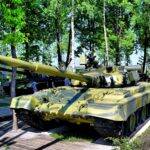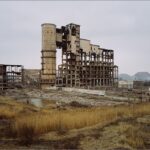At around the same time the video headlining this article was recorded, President Putin was hosting Russian Language, or Pushkin Day. This precedes Russia Day which is celebrated on 12 June. Putin spoke virtually from Novo Ogaryovo, his favoured residence on the outskirts of Moscow which boasts a heated, indoor, Olympic-sized swimming pool. Russian was one of the most expressive languages in the world, he extolled, ‘reflecting our spiritual and moral traditions, culture, and unique identity.’
The Russian president often blathers about Russia as a great ‘civilisational-state’. It is even written into the country’s national security doctrine: ‘Russian World’(Russkiy mir) as counterpoint to the wicked ‘Collective West’.
A reader glancing at the image would likely imagine it shows two Ukrainian soldiers at the bottom of a sand pit. Not so. The two unfortunates are Russian soldiers – refuseniks. Not visible in the footage is another Russian firing live rounds into the sand around them and taunting them. This ‘Russian World’ – a reality far removed from the scented, polished corridors of presidential villas in Moscow – is the subject of this article.
‘On the Russian Peasant’
In 1922, the Russian writer Maxim Gorky wrote a later much-quoted essay ‘On the Russian Peasant’. Why, Gorky mused, were Russians capable of apparently bottomless cruelty? ‘I experienced and saw many atrocities. I could never find a justification for their existence …Where does this human cruelty come from?’ His view of the Muscovite (Russian) national character was low and deserves to be quoted in full:
‘It seems to me that the most striking feature of the Moscow national character is actual cruelty, just like English humour. This is a special cruelty, and at the same time a cold-bloodedly invented measure of the degree of endurance and resistance in patience that man can attain…
The most interesting feature of Moscow brutality is its devilish finesse, its, I would say, aesthetic refinement. I do not think that these features can be explained by such words as “psychosis”, “sadism” or similar. Because in essence, they do not explain anything. A consequence of alcoholism? – But I do not think that the people of Moscow were more poisoned by alcohol than other European nations. However, it must be admitted that the influence of alcohol on the psyche of a Muscovite is particularly fatal because our nation is worse off than others.
I am not talking here about cruelty, which appears sporadically, like an explosion of a sick or perverted soul. These are exceptions that will chill a psychiatrist: here I am talking about mass psychology, about the nation’s soul, about collective cruelty.’
In Russia, he concluded, almost everyone enjoys beating someone.
On the ‘Special Military Operation’
Putin’s ‘Special Military Operation’ will be remembered for its barbarism. The Russian president arrogantly presumed to take Kyiv in three days and the rest of eastern and southern Ukraine in two weeks. Instead he has mired Russia in a disaster and revealed to the world the true nature of ‘Russian World’.
The Donbas, which he presumed to ‘liberate’, has been turned into a ravaged, depopulated wasteland, a region drained of children, jobs, hope or a future. Scores of settlements and towns have been erased from the map. The ‘Russian way of warfare’ has proved to be naked banditry. ‘This is not the ‘second army’ of the world,’ as one Ukrainian expressed following the invasion, ’this is a bunch of marauders, degenerates, executioners and rapists.’ From Kherson to Kharkiv, daily and nightly drone attacks on civilians and civilian infrastructure have not stopped for over three years.
Russian contempt for the Laws of Armed Conflict and International Red Cross (IRC) has been breath-taking. Ukrainian PoWs are currently dispersed in around 300 prisons across Russia (Ukraine maintains five transit centres and five permanent prisons). Moscow will not allow the IRC anywhere near Ukrainian PoWs and in flagrant disregard for the Geneva Conventions will not allow the prisoners to receive communications from relatives – a special form of torture both for the relatives and prisoners cut-off from the world. To date, at least 206 PoWs have died in captivity and 245 have been executed on the battlefield. Nine out of ten exchanged Ukrainian PoWs relate they were beaten in captivity.
Russian treatment of Ukrainian civilians trapped in occupied Ukraine – Putin’s ‘one people’ – has been abysmal. A policy of forced and illegal ‘passportisation’ has created an apartheid society. Ukrainians that resist are deprived of basic rights and services. The collapse of water utilities in the Donbas has led to constant water cuts and shortages – on occasions lasting days. The Russians will only distribute water if you show a Russian passport.
The incarceration of civilians has followed the same pattern as the treatment of PoWs. When the Russians finally returned the body of journalist Viktoria Roshchina, they first removed her brain, eyeballs and trachea to hide she had been strangled or suffocated. Insultingly, she was returned as ‘Body 757’ and labelled a male. Ukrainian DNA matching revealed the identity of the body and forensic examination showed numerous signs of torture and ill-treatment, including abrasions, haemorrhages, and a broken rib. How many Ukrainian civilians are being held in the Russian penal system, and their condition, remains an unknown.
Russian treatment of its own soldiers – the reluctant cannon-fodder of the daily ‘meat attacks’- has become notorious. ‘They are like zombies from the apocalypse,’ one Ukrainian drone operator has observed, ‘I never cease to be amazed at their attitude towards themselves and their people…In one attack, where there were dense, frantic storms, by the end we counted 127 dead Russians. And they still walked over these corpses. I can’t get used to it. They walk, walk, walk over a mountain of their corpses.’ One consequence of this brutality has been the phenomenon of refuseniks and the proliferation of punishment videos on the internet. A selection is illustrated below.
From left to right and top to bottom: soldiers from 345 Airborne Regiment placed naked in a punishment pit to ‘copulate with each other’ as an officer joked; a Russian soldier dragged screaming down a track tied to a pick-up; a Russian soldier from 1437 Motor Rifle Regiment strung up and beaten for getting drunk and missing an assault; the rest of his section died in the attack; a Russian soldier tied to a tree as bait for Ukrainian drones; two Russian soldiers tied to a tree and kicked in the head; Russian soldiers imprisoned in a septic tank and fed porridge in cupped hands; two Russian soldiers in a punishment pit forced to fight each other to death; the soldier on the left strangled the other to death.
Russia’s apologists
Despite this body of evidence, Russian apologists have not been few. The queue of ‘useful idiots’ is lengthy. They include a British left-wing politician and an American right-wing television presenter. The most famous French actor in the world (currently embroiled in a rape case) is in the club. The father of the richest man in the world recently visited Moscow and declared Russia one of the best countries in the world. A European national leader has been an advocate for Moscow from the beginning. Surprisingly, a left-wing South American president whose own life has been a history of imprisonment and abuse at the hands of dictatorial regimes has sided with the Russian dictator.
What are they not seeing? Weighing the box of medieval horrors opened by Putin, why would anyone wish ‘Russian World’ on Ukrainians?
Sergio Miller
Sergio Miller is a retired British Army Intelligence Corps officer. He was a regular contributor and book reviewer forBritish Army Review. He is the author of a two-part history of the Vietnam War (Osprey/Bloomsbury) and is currently drafting a history of the Russian invasion of Ukraine.





